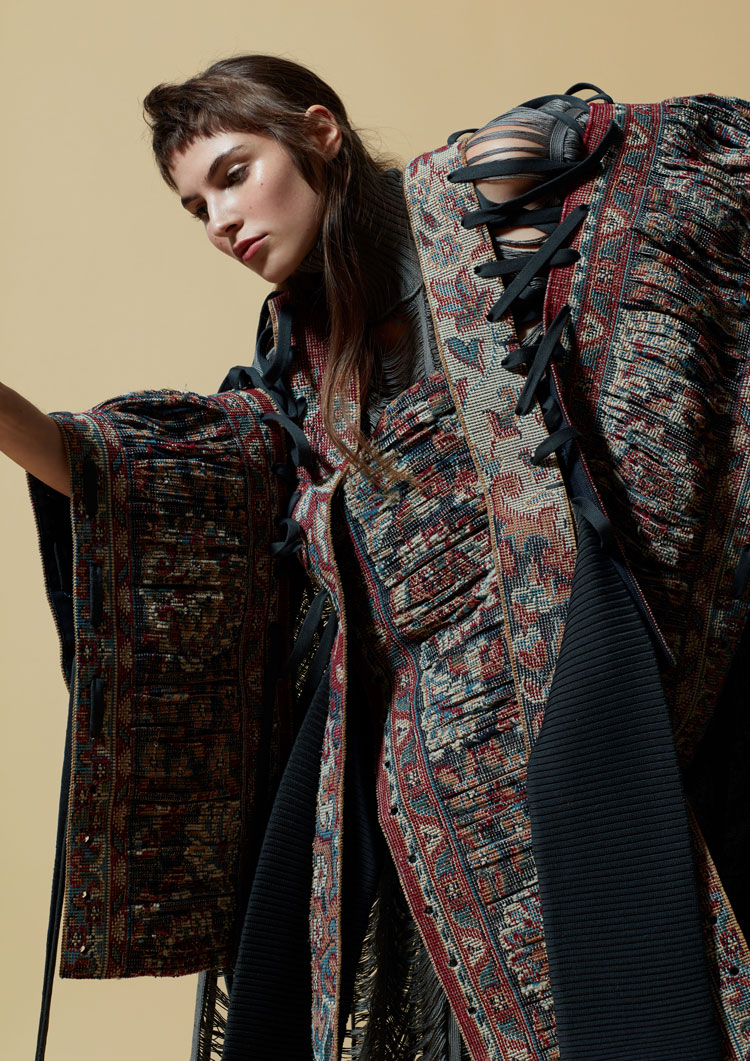First up in our Graduate Spotlight series for MA Fashion Design Technology Womenswear, Devon-native Leanne Callon shares her inspirations behind her work and tells us more about her time at LCF. Leanne’s work will be shown as part of our LCFMA18 MA Fashion Design Technology Womenswear catwalk show is on Thursday 15 February at 7pm GMT – watch the livestream here.

Photography: Alyssa Boni and Stylist: Adele Cany
Tell us about your final project…
My collection, Informal Arrangements, derives from a design background focusing on the processes, development and construction techniques that make up a garment. As a knitwear designer I strive to create an emotional response ensuring that my understanding of craft and construction is visible through my pieces. I have always been intrigued by the choices people make in selecting possessions to display and procure, thus, this collection looks at domestic spaces and the relationship between various materials placed in conjunction with others. One of the main features of this collection is the re-use of second-hand rugs. I have chosen to incorporate rugs into my collection due to their stance forming a direct link to my concept while also telling a visible story of its past life and former relationships. This collection is as much about the garments standing alone and being objects of desire and beauty as well as being functional pieces.
What techniques did you use in your collection?
Key elements forming this collection include the imitation of drapery through knitwear techniques using domestic and dubied machines (hand operated industrial), reversible knitted jacquards created on the Shima Seiki (computerised) machine, quilting, weaving, beading, tapestry and pleating. On many occasions I made a conscious decision to use the reverse side of my fabrication, as this outwardly displayed the processes behind the fabric and in most cases made the fabric more desirable.
What would be your top tips to new students?
My time at LCF has gone so so quickly, use your time wisely! I can’t actually believe I’ve finished my second collection. I can’t even remember doing it, I’ve been a sleep deprived zombie for months – be prepared for that, but have fun!
What made you chose LCF and London?
I did my BA at Kingston University and went to Graduate Fashion Week with my collection. After the show I was approached by Nigel Luck, the course leader of MA at LCF and was offered a scholarship to continue my studies, I gratefully accepted and here I am. As it goes, this course was a good fit for me as it emphasises the balance between creativity and technical skill and I am driven by finesse, quality and execution.
What were the highlights and biggest challenges of your course?
Alongside meeting some fab people who I’m very thankful to have spent the year with, the highlights of this course are seeing the finished garments, the reaction that people have to your work and getting feedback from the industry – the laboured construction process is satisfying and worthwhile on reflection of a finished piece. The biggest challenge was the travel to and from school, I do not travel lightly…
Have you been on a work placement or internship…
I experienced a few internships in the summer gaps during my BA but came straight to MA.
My biggest inspirations and muses are…
I became obsessed with Mark Borthwick’s work throughout this MA. Influenced by his ‘all events are even’ photobook, I have become akin to curating my own inspiration images using a muse in order to experiment on the body and create my own series of images for inspiration. I have been developing a concept based on adjustable, interchangeable garments for a modular approach towards a more sustainable economy. Selected garments can be disassembled, anchored and reconstructed in multiple ways while still being functional and practical, allowing the wearer to re-invent the garment to fit their needs.
The motto of my collection is ‘The far reaches of possibility’, referring to the iterations of garments, but also the potential of found fabrics that you wouldn’t expect to be used in clothing. ‘An individual statement exists because of how we assign personal value to things’ – Mark Borthwick, prompting the concept for my collection and exploration of a new sustainable method of dress.
What are your plans for life after your MA…
Besides hoping to be employed… I would love to invest in my own Dubied knit machine, then perhaps I can do some freelancing while continuing to develop my modular clothing concept.

